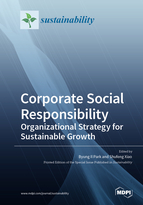Corporate Social Responsibility: Organizational Strategy for Sustainable Growth
A special issue of Sustainability (ISSN 2071-1050).
Deadline for manuscript submissions: closed (16 October 2021) | Viewed by 34438
Special Issue Editors
Interests: knowledge acquisition from MNEs; MNE subsidiary performance; corporate social responsibility of MNEs; the impacts of FDI on economic growth
Special Issues, Collections and Topics in MDPI journals
Interests: emerging multinational enterprises; institutional theory in strategic management, entrepreneurship and innovation, and foreign subsidiary; management in emerging markets, with a particular focus on China and India
Special Issues, Collections and Topics in MDPI journals
Special Issue Information
Dear Colleagues,
Despite its current variations, corporate social responsibility (CSR) frameworks can be defined as voluntary actions by firms that appear to advance social good at an activity level “above and beyond” that required by law (Park, Chidlow, and Choi, 2014). There is no doubt that being socially responsible is crucial in itself, but organizations must make sensible decisions about the level at which to leverage their CSR activities, and then translate social good into strategic benefit (Choi, Choi, Choi and Chung, 2020; Polonsky, and Jevons, 2009). Through strategies based on CSR, firms often progress to where they use organizational core resources to improve their competitiveness and performance, which again helps to lead to sustainable growth. Considering the financial value of CSR, relevant business research is in the limelight and shows that firms undertaking stronger CSR commonly attract consumers (in marketing), meet investor expectations (in finance), satisfy internal employees (in management), and successfully compete against local and global companies (in strategic international business).
In this line, this is the time to, first, synthesize different research fragments on CSR, second, combine CSR with an additional unique agenda (e.g., human rights, win-win partnership, official development assistance), and third, compile all the theoretical and empirical studies for organizational sustainability. Thus, by inviting submissions from researchers who study diverse theoretical perspectives, adopt varied empirical approaches, and perform multiple levels of analysis, as well as qualitative and quantitative experiments, literature reviews, and meta-analyses, this Special Issue aims to draw a comprehensive picture of CSR. We welcome submissions from various disciplines but are not limited to the following topics:
- Corporate social responsibility as part of organizational strategy;
- Corporate social responsibility as conduit for sustainable growth;
- Corporate social responsibility as a means for win-win partnerships;
- Corporate social responsibility associated with human rights;
- Corporate social responsibility related to official development assistance;
- Stakeholder influences on corporate social responsibility in various disciplines;
- Institutional pressures for corporate social responsibility in diverse domains;
- Relationship between the level of corporate social responsibilty and long-lived companies (i.e., proxy for sustainability).
References
Choi, D.; Choi, P.M.S.; Choi, J.H.; Chung, C.Y. Corporate Governance and Corporate Social Responsibility: Evidence from the Role of the Largest Institutional Blockholders in the Korean Market. Sustainability 2020, 12, 1680.
Park, B.I.; Ghauri, P.N. Determinants influencing CSR practices in small and medium sized MNE subsidiaries: A stakeholder perspective. Journal of World Business 2015, 50, 192-204.
Park, B.I.; Chidlow, A.; Choi, J. Corporate social responsibility: Stakeholders influence on MNEs’ activities. International Business Review 2014, 23, 966-980.
Polonsky, M.; Jevons, C. Global branding and strategic CSR: An overview of three types of complexity, International Marketing Review 2009, 26, 327-347.
Prof. Byung Il Park
Prof. Simon Shufeng Xiao
Guest Editors
Manuscript Submission Information
Manuscripts should be submitted online at www.mdpi.com by registering and logging in to this website. Once you are registered, click here to go to the submission form. Manuscripts can be submitted until the deadline. All submissions that pass pre-check are peer-reviewed. Accepted papers will be published continuously in the journal (as soon as accepted) and will be listed together on the special issue website. Research articles, review articles as well as short communications are invited. For planned papers, a title and short abstract (about 100 words) can be sent to the Editorial Office for announcement on this website.
Submitted manuscripts should not have been published previously, nor be under consideration for publication elsewhere (except conference proceedings papers). All manuscripts are thoroughly refereed through a single-blind peer-review process. A guide for authors and other relevant information for submission of manuscripts is available on the Instructions for Authors page. Sustainability is an international peer-reviewed open access semimonthly journal published by MDPI.
Please visit the Instructions for Authors page before submitting a manuscript. The Article Processing Charge (APC) for publication in this open access journal is 2400 CHF (Swiss Francs). Submitted papers should be well formatted and use good English. Authors may use MDPI's English editing service prior to publication or during author revisions.
Keywords
- corporate social responsibility
- sustainable growth
- strategic international business
- organizational sustainability
- marketing
- finance
- business management
- win-win partnership
- human rights







